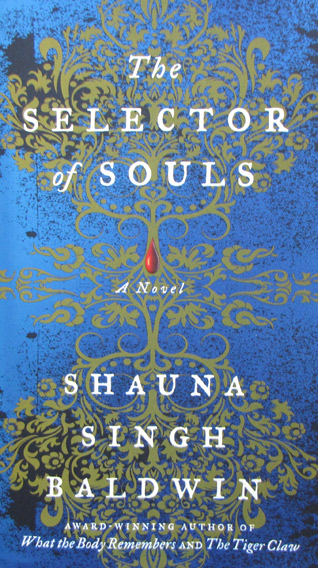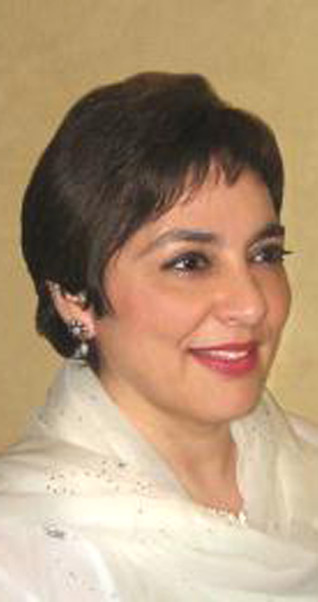Books
Talking to Shauna Singh Baldwin
About Her New Novel
An Interview by ROSALIA SCALIA
Her first in seven years, award-winning and best- selling Sikh-Canadian author, Shauna Singh Baldwin’s newest novel, The Selector of Souls, will be released this month. Published by Random House Canada, and set in India, this book explores what it means to be born a girl in a world that favors men.
The book depicts two, strong-willed women who must find creative ways to survive by circumventing the strict social structures imposed on them. The women -- a mid-wife named Damini and Anu, who is fleeing an abusive marriage -- cross paths
in Gurkot village; each believes they’re acting in the best interest of the women around them in regard to health, education, justice and gender equality, and each must adapt and change in order to transform their communities from within.
Rosalia Scalia and Shauna Singh Baldwin discuss the latter's forthcoming book:
Rosalia Scalia ["RS"]: In The Selector of Souls, you manage to touch on issues that plague women worldwide, not just in the Gurkot village. Rano in Canada, Sister Immaculata -- the Irish Catholic nun representing the west but working in India, and the women of India -- Anu, Mem-saab, Damini, Leela, and Kiran -- all struggle for place in the world.
Shauna Singh Baldwin ["SSB"]: If I tried to think about all that at the beginning, I'd scare myself into writer's block! I just set out as usual, following images and characters and their relationships. However, when you're editing, you learn what it is that you mean to say. And then you can sharpen and move and cut away and buff and polish the story and characters for aesthetic and political balance.
RS: Was there ever a time as a writer you felt yourself backing away from the challenges the characters face?
SSB: Often. I love these characters and want them to be happy. I wrote about three hundred pages of back story, about how they came to their problems. I had to throw all that work out around 2007. Then I could really face their conflicts and bring them through. While you can evade conflicts in real life or engage in repetitive patterns of behavior, a story demands that you resolve, address or manage the problem(s). Not that you can fix every problem but the problems must be addressed.
RS: Domestic violence, for instance, exists in every country, cuts across every socio-economic level, and is difficult to write about. Many modern day women -- even in the west -- lack Anu's courage and conviction to leave. Do you attribute her ability to leave Dadu and the way he treated his daughter. Or to self-preservation. (If only more women possessed Anu's courage!)
SSB: In The Selector of Souls, Anu has and takes the opportunity to get away because her child is temporarily safe on a visit to her aunt in Toronto. Anu is really afraid for her own life, and afraid she may kill her husband. But we can't say "if only many more women possessed Anu's courage" because so many women in domestic violence situations are held hostage by the
fact of having dependents -- whether elders or children. A woman does what she can, when she can, and when she feels her child or children will not pay the price.
RS: Anupum is considered a male name. In a patriarchal, conservative society, that Anupam makes her own decisions without regard to what her family thinks is revolutionary. She behaves with the self-determination of a man. Is this why you gave her a masculine name?
SSB: I've known a few female Anupams, mostly Punjabi. It means special, and I think it suits her. Anupam tries to make her own decisions but also tries to get elders to approve. She pays attention to the objections of those whose judgment she respects -- her aunt, her father. I feel she behaves with as much self-determination as any privileged, Hindu 'high caste' woman can, but is still circumscribed. Of course, so are the men around her.
RS: Anu's Uncle Sharad seems confused. He’s lovable, loving, but blind, unaware of the impact of his old- fashion notion that Anu and her abusive husband should patch it up. He doesn’t seem to fully understand the situation, fails to realized that Anu never wants to patch it up. His wife Purnima seems much more on the ball.
SSB: Uncle Sharad is a most aggravating man, dutiful to a fault. And I thought Purnima was a wonderfully progressive feminist till I wrote her letter from the 1995 Cairo Conference (that was fun!). She's rather loving and blind, too -- she didn't know her niece was experiencing awful times because she didn't want that to be true. She acknowledges her blindness, which is refreshing.
RS: I've grown up with the notion of people talking to and being aware of a spirit world and with a superstitious unnamed Old World religion existing side by side with Catholicism. Damini sees and speaks to spirits. How did this aspect of her character come to you?
SSB: Like Damini, I speak to imaginary friends and dead people all the time -- it's my job. I just do it on paper. (Businessmen do it all the time, apparently, now the US Supreme Court has ruled incorporated entities have free speech.)
RS: Is this a common phenomenon among some women in India?
SSB: Some of us become comfortable with the unseen and with absence, especially after you have lost a beloved person. I don't think location or culture has much to do with it.
RS: I've personally begun considering myself a Catholic-Sikh, despite practicing neither. In this book, characters often switch back and forth between faiths in comical ways, but the swtiching speaks to what many people who aren’t fundamentalists experience.
SSB: Yes, we can enjoy each other's faiths and allow different aspects and ideas to support and comfort us. I went to Catholic school and college and grad school, and can be as transported by Mass as by Kirtan.
RS: How did Damini come to you? Did you know her this fully when writing "A Pair of Ears?"
SSB: Damini was a minor character who kept returning to mind. Finally I gave up and asked for her story.
RS: In "A Pair of Ears," the sons are named Balvir and Jai. When you wrote this story originally, was the Mem-saab Roop or another Mem-saab?
SSB: She was Roop [from What The Body Remembers] -- I just didn't know it.
RS: The sons' names evolved from Balvir and Jai to Aman and Timcu -- did the characters evolve as well?
SSB: I feel the consciousness is the same as that of Amanjit and Timcu. Amanjit (his name makes me laugh -- it means victory of peace) is the kid who keeps slipping out of everyone's arms in What The Body Remembers, and he's slippery in The Selector of Souls, too.
RS: Or are they totally different? Can you talk about the evolution of the voice from "A Pair of Ears" to Damini?
SSB: The focus of "A Pair of Ears" is on Mem-saab, whereas the focus of The Selector of Souls is on Damini. The shift is subtle, and changes the tone of the text.
RS: I love her practicality in addressing religious notions -- her comments about the priests and men in general who, proclaiming their connection to the divine and imposing hardships on women, are pretty funny! And so are combat boots. She’s definitely amid a battle.
SSB: You got it.
RS: To me, Vikas -- Anu’s husband -- did not change much over the course of the novel, except perhaps in growing more toward Hindu fundamentalism. I wanted to feel pity or something for him but couldn't.
SSB: Yes, Vikas rejects love as weakness. He's pure business: opportunistic, with a user mentality. He compares everything he gets to something else so he'll never be satisfied. But he does see his role, power, and choices with brutal honesty, a refreshing shift from Anu's idealism. He wasn't permitted to love a Sikh woman, he won't permit himself to love or be married to a Christian. He doesn't believe he can nurture a girl.
ABOUT THE WRITING PROCESS
RS: What was the most difficult character to render?
SSB: Damini's son, Vikas' fixer, Suresh. I had to read many books by Aryan-supremacist "Hindus" and many contemporary histories of India to make this minor but pivotal character believable and build his life's events. The gulf between his world view and mine was incredible. My most positive values and ideals are his negatives: multiculturalism, feminism, diversity. My most negative personal values are his positives. Unfortunately he has a great deal in common with the real-life Aryan-supremacist "Christian" who shot six people at my gurdwara (in Wisconsin) a month before this novel was published. But eventually Suresh is pitiable.
RS: Novelists love all their characters -- the good and not good ones -- did you struggle with this at all during the writing of the book? Which man did you like best?
SSB: I like Anu's father Dadu, though as I found out from writing his story, he's not perfect. But he believes Anu deserves to be happy and treats her as an individual, beyond her role as his daughter. That makes him different and special.
RS: How did you come to the structure -- of the dates, etc.?
SSB: I didn’t want to write about war, having written two novels set in wars. I just wanted to write a story about a pair of cousins, one in India and one in Canada. I really thought I was exploring what life would have been like had I lived in India or Canada in the 1990s. But another story appeared in questions, and I began writing it in parallel: what happened to the maid servant from my short story, "A Pair of Ears" (English Lessons and Other Stories, Goose Lane 1996)? How did Roop’s children from What The Body remembers turn out? And how were these connected? Writing about a domestic violence situation was far from entertaining.
Moreover, it can turn the reader into a voyeur. So in 2007, I threw out 300 pages, moved the story forward 10 years and began to write again. That decision made me think about abortion and the choice to create -- or not. When is destruction better than creating a new human being in the world? Moving the story forward 10 years also changed the backdrop. The 90s were years of rising masculinization in India, Hindu fundamentalism, and the 1998 nuclearization.
RS: What was the most rewarding part of writing this book -- where you felt most in the zone?
SSB: Unlike my previous novels, The Selector of Souls is complete fiction. It has several imaginary locations, including imaginary gods and goddesses. It was fun creating them. I loved writing about the creative process in the Jagar (Awakening) scenes.
RS: I felt sad for Anu feeling compelled to make a difficult choice, neither being palatable. Which does she choose?
SSB: I left her where you did ...
For more information about Shauna Singh Baldwin and her work, please CLICK here.
The Selector or Souls can be pre-ordered at any major book store or directly from Random House by CLICKING here.
September 17, 2012
Conversation about this article
1: Roop Dhillon (London, United Kingdom), September 17, 2012, 10:42 AM.
A professor in Punjab should translate her books into Punjabi.
2: Amandeep Sandhu (Delhi, India), September 18, 2012, 2:07 PM.
Excellent interview. Kudos to Rosalia and to Shauna. I look forward to reading "The Selector of Souls".
3: Harjinder singh (Kalala, Punjab), September 18, 2012, 9:38 PM.
Thanks, Catholic-Sikh Rosalia ji!




